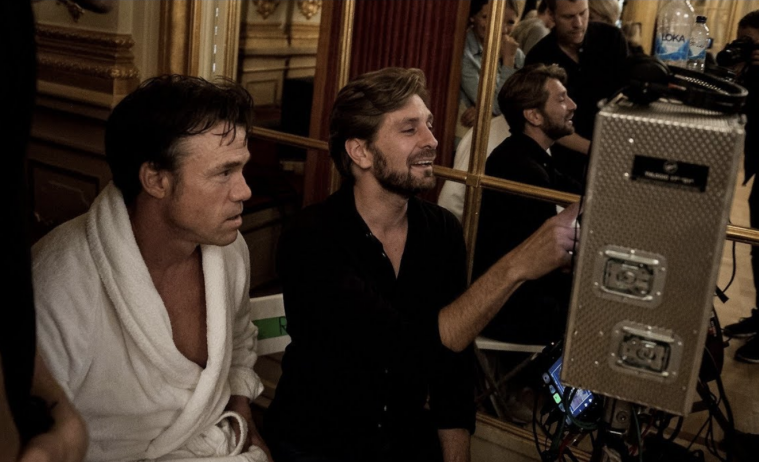It’s very seldom that a Palme d’Or winning film should also win Best Foreign Language Film at the Academy Awards, but Ruben Östlund’s The Square could buck the trend this Sunday. If his film wins, it would be the fourth Oscar for Sweden. (Ingmar Bergman won the previous three statues.)
The Square posits ideas about liberal democratic social contracts through a controversial but ultimately banal art exhibit at a museum in Stockholm. The museum’s chief art curator Christian (Claes Bang) goes through a series of personal and professional crises that leave him jobless. Once jobless, Christian is finally free of the social structures finally that didn’t award honesty.
Often funny and simultaneously depressing, The Square is a Buñuelian satire of the West’s flexible social values and specifically the patrons of high art. It turns a mirror on the affluent milieu who award themselves for giving lip service to helping their fellow man. We spoke with director Ruben Östlund about the film’s political underpinnings.
Do you get subversive joy when your movie screens for the very art patrons you satirize in The Square?
Yes, definitely. One reason I made the monkey scene with a tuxedo-dressed audience because it was going to screen at Cannes in front of a tuxedo-dressed audience looking at themselves. That’s a way to put a mirror up to the audience and the kind of social class that’s going to Cannes. We’ve screened the film at all of the major festivals for the same reason.
One of the hallmarks of white liberal enlightened people is to point out the hollowness of other people’s virtue. So as someone who works with the tuxedo-dressed audience you mention, what is The Square saying about them?
Shame, shame on you! [Laughs.] No, but I look at Christian (Claes Bang) also the same way I look at myself. I don’t think that Christian is hypocritical, I think he actually believes in the kind of questions that the square exhibit poses and he thinks it’s good to promote that. For me, I don’t think we should put that much judgment on an individual when they are behaving badly because we have to look at the situation that is creating the behavior. I think there’s a lot of situations in which we can do something that is kind of stupid and it’s knowledge about the situation that can cause us to behave in a different way. Being a good person is not about character–it’s about education. Or if you have experience with a situation that is similar. I wonder when it is possible for me to behave in the same way as Christian. I try to imagine a set up where it is possible to behave in the same way, even though he’s doing quite stupid things. I never want to make the character someone who is bad or unbelievably stupid, even though we’re dealing with satire. I’m twisting the reality a little bit.
If you’re not critiquing Christian, but a milieu of people, is your criticism that liberal politics are an abyss and the only ones who can make it out alive are the ones in charge?
Liberal has a different meaning in Europe than it has in the United States. Liberal in Sweden means everyone has the same possibility in life but seeing people in their context and seeing how the context is limiting them or making things possible for them. When my country was exposed to Romanian beggars a few years ago we were kind of shocked because we haven’t dealt with this issue that much before. I think in the beginning our feeling was: is it my responsibility as an individual to deal with this or is it the state’s? Very quickly we took the responsibility and put it on the individual level. The discussion was: do you give money to beggars or don’t? And should you feel ashamed if you didn’t do it? At the same time, you’re only feeling powerless, you don’t feel like you have any possibility to change a beggars life by giving them a couple of coins. This is a problem we should solve as a community together. I thought it was a little scary we didn’t talk about raising taxes to deal with it. Instead we talked about it on an individual level. But that isn’t a realistic way of looking at the world because that isn’t the way to solve these problems. Why are we putting the responsibility on the individual and taking away the ability to organize ourselves and doing things together? I feel a lack of the common project in our time.
That reminds me of the scene where Christian is on the phone and takes blame for the letter he wrote but changes gears to blames society.
I can relate it to something I’m close to. My mother was a teacher and she was telling me Swedish schools have not been that good in the last year. They have less money to provide a good education, the teachers have too many pupils in the classroom, etc. She described the breaking point as the teachers receiving individual salaries. When that happened they couldn’t organize as individuals and tell their bosses if their work circumstances became worse they would strike. Because they each received different salaries, they didn’t want to be considered troublemakers in front of the boss. I think the economic system is making us very lonely and scared. In the end, when Christian decided he’s going to do the right thing and apologize for what he’s done, that only happened after he lost his position at the museum. He has already lost what he was afraid of losing.
The Square is now on Digital HD and DVD.

